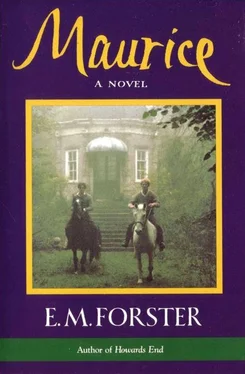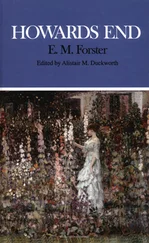"Look here, old man, I can't be cross-questioned."
"You said you could."
"Not about your sister."
"Why not?"
"You must shut up, I say. Come back to what I was saying about character — the real tie between human beings. You can't build a house on the sand, and passion's sand. We want bed rock."
"Ada!" he called, suddenly deliberate.
Clive shouted in horror. "What for?"
"Ada! Ada!"
He rushed at the door and locked it. "Maurice, it mustn't end like this — not a row," he implored. But as Maurice approached he pulled out the key and clenched it, for chivalry had awoken at last. "You can't drag in a woman," he breathed; "I won't have it."
"Give that up."
"I mustn't. Don't make it worse. No — no."
Maurice bore down on him. He escaped: they dodged round the big chair, arguing for the key in whispers.
They touched with hostility, then parted for ever, the key falling between them.
"Clive, did I hurt you?"
"No."
"My darling, I didn't mean to."
"I'm all right."
They looked at one another for a moment before beginning new lives. "What an ending," he sobbed, "what an ending."
"I do rather love her," said Clive, very pale.
"What's going to happen?" said Maurice, sitting down and wiping his mouth. "Arrange… I'm done for."
Since Ada was in the passage Clive went out to her: to Woman was his first duty. Having appeased her with vague words, he returned to the smoking-room, but the door was now locked between them. He heard Maurice turn out the electric light and sit down with a thud.
"Don't be an ass anyway," he called nervously. There was no reply. Clive scarcely knew what to do. At any rate he could not stop in the house. Asserting a man's prerogative, he announced that he must sleep in town after all, in which the women acquiesced. He left the darkness within for that without: the leaves fell as he went to the station, the owls hooted, the mist enveloped him. It was so late that the lamps had been extinguished in the suburban roads, and total night without compromise weighed on him, as on his friend. He too suffered and exclaimed, "What an ending!" but he was promised a dawn. The love of women would rise as certainly as the sun, scorching up immaturity and ushering the full human day, and even in his pain he knew this. He would not marry Ada — she had been transitional — but some goddess of the new universe that had opened to him in London, someone utterly unlike Maurice Hall.
26
For three years Maurice had been so fit and happy that he went on automatically for a day longer. He woke with the feeling that it must be all right soon. Clive would come back, apologizing or not as he chose, and he would apologize to Clive. Clive must love him, because his whole life was dependent on love and here it was going on as usual. How could he sleep and rest if he had no friend? When he returned from town to find no news, he remained for a little calm, and allowed his family to speculate on Clive's departure. But he began to watch Ada. She looked sad — even their mother noticed it. Shading his eyes, he watched her. Save for her, he would have dismissed the scene as "one of Clive's long speeches", but she came into that speech as an example. He wondered why she was sad.
"I say — " he called when they were alone; he had no idea what he was going to say, though a sudden blackness should have warned him. She replied, but he could not hear her voice. "What's wrong with you?" he asked, trembling.
"Nothing."
"There is — I can see it. You can't take me in."
"Oh no — really, Maurice, nothing."
"Why did — what did he say?"
"Nothing."
"Who said nothing?" he yelled, crashing both fists on the table. He had caught her.
"Nothing — only Clive."
The name on her lips opened Hell. He suffered hideously and before he could stop himself had spoken words that neither ever forgot. He accused his sister of corrupting his friend. He let her suppose that Clive had complained of her conduct and gone back to town on that account. Her gentle nature was so outraged that she could not defend herself, but sobbed and sobbed, and implored him not to speak to her mother, just as if she were guilty. He assented: jealousy had maddened him.
"But when you see him — Mr Durham — tell him I didn't mean — say there's no one whom I'd rather —"
" — go wrong with," he supplied: not till later did he understand his own blackguardism.
Hiding her face, Ada collapsed.
"I shall not tell him. I shall never see Durham again to tell. You've the satisfaction of breaking up that friendship."
She sobbed, "I don't mind that — you've always been so unkind to us, always." He drew up at last. Kitty had said that sort of thing to him, but never Ada. He saw that beneath their obsequious surface his sisters disliked him: he had not even succeeded at home. Muttering "It's not my fault," he left her.
A refined nature would have behaved better and perhaps have suffered less. Maurice was not intellectual, nor religious, nor had he that strange solace of self-pity that is granted to some. Except on one point his temperament was normal, and he behaved as would the average man who after two years of happiness had been betrayed by his wife. It was nothing to him that Nature had caught up this dropped stitch in order to continue her pattern. While he had love he had kept reason. Now he saw Clive's change as treachery and Ada as its cause, and returned in a few hours to the abyss where he had wandered as a boy.
After this explosion his career went forward. He caught the usual train to town, to earn and spend money in the old manner; he read the old papers and discussed strikes and the divorce laws with his friends. At first he was proud of his self-control: did not he hold Clive's reputation in the hollow of his hand? But he grew more bitter, he wished that he had shouted while he had the strength and smashed down this front of lies. What if he too were involved? His family, his position in society — they had been nothing to him for years. He was an outlaw in disguise. Perhaps among those who took to the greenwood in old time there had been two men like himself — two. At times he entertained the dream. Two men can defy the world.
Yes: the heart of his agony would be loneliness. He took time to realize this, being slow. The incestuous jealousy, the mortification, the rage at his past obtuseness — these might pass, and having done much harm they did pass. Memories of Clive might pass. But the loneliness remained. He would wake and gasp "I've no one!" or "Oh Christ, what a world!" Clive took to visiting him in dreams. He knew there was no one, but Clive, smiling in his sweet way, said "I'm genuine this time," to torture him. Once he had a dream about the dream of the face and the voice, a dream about it, no nearer. Also old dreams of the other sort, that tried to disintegrate him. Days followed nights. An immense silence, as of death, encircled the young man, and as he was going up to town one morning it struck him that he really was dead. What was the use of money-grubbing, eating, and playing games? That was all he did or had ever done.
"Life's a damn poor show," he exclaimed, crumpling up the Daily Telegraph.
The other occupants of the carriage who liked him began to laugh.
"I'd jump out of the window for twopence."
Having spoken, he began to contemplate suicide. There was nothing to deter him. He had no initial fear of death, and no sense of a world beyond it, nor did he mind disgracing his family. He knew that loneliness was poisoning him, so that he grew viler as well as more unhappy. Under these circumstances might he not cease? He began to compare ways and means, and would have shot himself but for an unexpected event. This event was the illness and death of his grandfather, which induced a new state of mind.
Читать дальше












